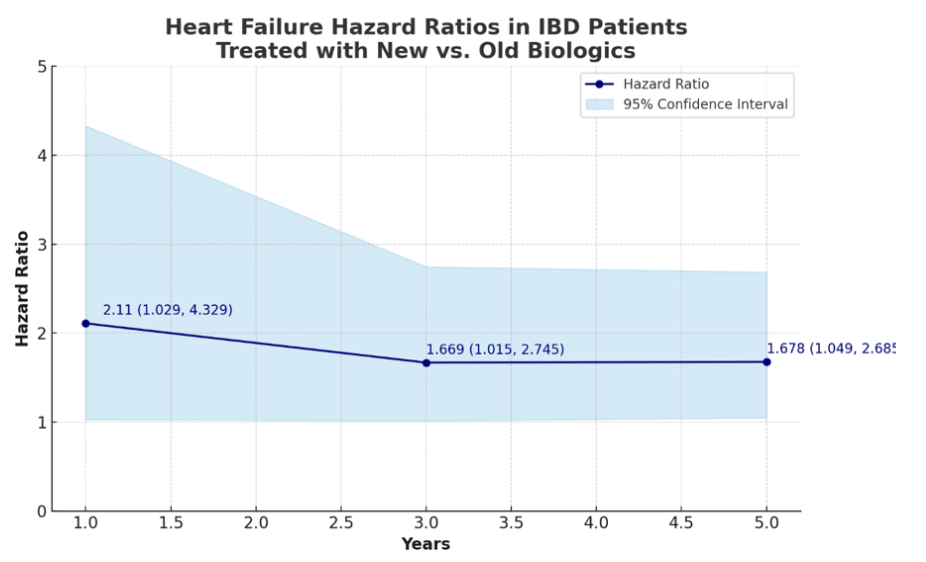Monday Poster Session
Category: IBD
P3310 - Real-World Data Reveals Reduced Heart Failure Risk With New Biologics Compared to Old Biologics in Inflammatory Bowel Disease: A 5-Year Comparative Study
Monday, October 27, 2025
10:30 AM - 4:00 PM PDT
Location: Exhibit Hall

Omar Arman, MD, MPH
University at Buffalo
Depew, NY
Presenting Author(s)
Omar Arman, MD, MPH1, Kamal Hamad, MD2, Khaled Rafeh, MD3, Ahmad Younis, MD4, Amer Arman, MD5, Ameera Elqasass, MD6, Abdulrahman Arman, MD7, Mazen Zamzam, BS8, Osama Alshakhatreh, MD9, Jad Bou-Abdallah, MD1
1University at Buffalo, Buffalo, NY; 2Jordan University of Science and Technology, Irbid, Irbid, Jordan; 3School of Medicine, The University of Jordan, Shmeisani, 'Amman, Jordan; 4Cleveland Clinic, Cleveland, OH; 5MedStar Health, Washington, WA; 6University of Jordan, Amman, 'Amman, Jordan; 7University of Jordan School of Medicine, Amman, 'Amman, Jordan; 8Oakland University William Beaumont School of Medicine, Royal Oak, MI; 9Albany Medical Center, Albany, NY
Introduction: Heart failure (HF) is a serious cardiovascular complication in inflammatory bowel disease (IBD), driven by systemic inflammation and potential treatment side effects. While older biologics such as anti-TNF agents have been the cornerstone of therapy, newer biologics targeting integrins or IL-12/23 pathways offer novel mechanisms of action that may further reduce systemic inflammation and cardiovascular risks. Leveraging real- world data, this study evaluates the risk of HF in IBD patients treated with old versus new biologics over five years, providing practical insights into their long-term safety.
Methods: We analyzed real-world data from the TriNetX research network, focusing on adult IBD patients treated with biologics between 2015–2023. Patients with prior cardiovascular conditions were excluded. Propensity score matching balanced demographics, comorbidities, and disease severity between cohorts (n = 22,009 each). The cohort balance was validated through propensity score distributions before and after matching. HF risk and survival probabilities were assessed at 1, 3, and 5 years using Kaplan-Meier survival analysis, risk differences, risk ratios (RR), odds ratios (OR), and hazard ratios (HR) to compare groups.
Results: New biologics consistently outperformed old biologics in reducing HF risk (Figure 1). At 1 year, HF risk was significantly lower in the new biologics group (HR: 2.11, 95% CI: 1.029–4.329, p = 0.04), a benefit sustained at 3 years (HR: 1.669, 95% CI: 1.015–2.745, p = 0.049) and 5 years (HR: 1.678, 95% CI: 1.049–2.685, p = 0.036). Kaplan-Meier analysis revealed higher HF-free survival probabilities for new biologics at all time points: 99.94% vs. 99.88% at 1 year, 99.82% vs. 99.73% at 3 years, and 99.77% vs. 99.62% at 5 years (p < 0.05 for all comparisons.
Discussion: Our analysis demonstrates that new biologics substantially reduce HF risk in IBD patients compared to older biologics, with consistent improvements in HF-free survival over five years. This study provides valuable insights into the cardiovascular safety of newer therapies and emphasizes the importance of integrating cardiovascular risk assessment into treatment decisions. These findings have direct implications for future clinical guidelines, particularly in optimizing biologic therapy selection for IBD patients at high cardiovascular risk. Future research should validate these results in diverse populations and further explore the mechanisms driving these cardiovascular benefits.

Figure: Figure 1: Hazard ratios and 95% confidence intervals for heart failure risk in IBD patients treated with
new vs. old biologics over 5 years.
Disclosures:
Omar Arman indicated no relevant financial relationships.
Kamal Hamad indicated no relevant financial relationships.
Khaled Rafeh indicated no relevant financial relationships.
Ahmad Younis indicated no relevant financial relationships.
Amer Arman indicated no relevant financial relationships.
Ameera Elqasass indicated no relevant financial relationships.
Abdulrahman Arman indicated no relevant financial relationships.
Mazen Zamzam indicated no relevant financial relationships.
Osama Alshakhatreh indicated no relevant financial relationships.
Jad Bou-Abdallah indicated no relevant financial relationships.
Omar Arman, MD, MPH1, Kamal Hamad, MD2, Khaled Rafeh, MD3, Ahmad Younis, MD4, Amer Arman, MD5, Ameera Elqasass, MD6, Abdulrahman Arman, MD7, Mazen Zamzam, BS8, Osama Alshakhatreh, MD9, Jad Bou-Abdallah, MD1. P3310 - Real-World Data Reveals Reduced Heart Failure Risk With New Biologics Compared to Old Biologics in Inflammatory Bowel Disease: A 5-Year Comparative Study, ACG 2025 Annual Scientific Meeting Abstracts. Phoenix, AZ: American College of Gastroenterology.
1University at Buffalo, Buffalo, NY; 2Jordan University of Science and Technology, Irbid, Irbid, Jordan; 3School of Medicine, The University of Jordan, Shmeisani, 'Amman, Jordan; 4Cleveland Clinic, Cleveland, OH; 5MedStar Health, Washington, WA; 6University of Jordan, Amman, 'Amman, Jordan; 7University of Jordan School of Medicine, Amman, 'Amman, Jordan; 8Oakland University William Beaumont School of Medicine, Royal Oak, MI; 9Albany Medical Center, Albany, NY
Introduction: Heart failure (HF) is a serious cardiovascular complication in inflammatory bowel disease (IBD), driven by systemic inflammation and potential treatment side effects. While older biologics such as anti-TNF agents have been the cornerstone of therapy, newer biologics targeting integrins or IL-12/23 pathways offer novel mechanisms of action that may further reduce systemic inflammation and cardiovascular risks. Leveraging real- world data, this study evaluates the risk of HF in IBD patients treated with old versus new biologics over five years, providing practical insights into their long-term safety.
Methods: We analyzed real-world data from the TriNetX research network, focusing on adult IBD patients treated with biologics between 2015–2023. Patients with prior cardiovascular conditions were excluded. Propensity score matching balanced demographics, comorbidities, and disease severity between cohorts (n = 22,009 each). The cohort balance was validated through propensity score distributions before and after matching. HF risk and survival probabilities were assessed at 1, 3, and 5 years using Kaplan-Meier survival analysis, risk differences, risk ratios (RR), odds ratios (OR), and hazard ratios (HR) to compare groups.
Results: New biologics consistently outperformed old biologics in reducing HF risk (Figure 1). At 1 year, HF risk was significantly lower in the new biologics group (HR: 2.11, 95% CI: 1.029–4.329, p = 0.04), a benefit sustained at 3 years (HR: 1.669, 95% CI: 1.015–2.745, p = 0.049) and 5 years (HR: 1.678, 95% CI: 1.049–2.685, p = 0.036). Kaplan-Meier analysis revealed higher HF-free survival probabilities for new biologics at all time points: 99.94% vs. 99.88% at 1 year, 99.82% vs. 99.73% at 3 years, and 99.77% vs. 99.62% at 5 years (p < 0.05 for all comparisons.
Discussion: Our analysis demonstrates that new biologics substantially reduce HF risk in IBD patients compared to older biologics, with consistent improvements in HF-free survival over five years. This study provides valuable insights into the cardiovascular safety of newer therapies and emphasizes the importance of integrating cardiovascular risk assessment into treatment decisions. These findings have direct implications for future clinical guidelines, particularly in optimizing biologic therapy selection for IBD patients at high cardiovascular risk. Future research should validate these results in diverse populations and further explore the mechanisms driving these cardiovascular benefits.

Figure: Figure 1: Hazard ratios and 95% confidence intervals for heart failure risk in IBD patients treated with
new vs. old biologics over 5 years.
Disclosures:
Omar Arman indicated no relevant financial relationships.
Kamal Hamad indicated no relevant financial relationships.
Khaled Rafeh indicated no relevant financial relationships.
Ahmad Younis indicated no relevant financial relationships.
Amer Arman indicated no relevant financial relationships.
Ameera Elqasass indicated no relevant financial relationships.
Abdulrahman Arman indicated no relevant financial relationships.
Mazen Zamzam indicated no relevant financial relationships.
Osama Alshakhatreh indicated no relevant financial relationships.
Jad Bou-Abdallah indicated no relevant financial relationships.
Omar Arman, MD, MPH1, Kamal Hamad, MD2, Khaled Rafeh, MD3, Ahmad Younis, MD4, Amer Arman, MD5, Ameera Elqasass, MD6, Abdulrahman Arman, MD7, Mazen Zamzam, BS8, Osama Alshakhatreh, MD9, Jad Bou-Abdallah, MD1. P3310 - Real-World Data Reveals Reduced Heart Failure Risk With New Biologics Compared to Old Biologics in Inflammatory Bowel Disease: A 5-Year Comparative Study, ACG 2025 Annual Scientific Meeting Abstracts. Phoenix, AZ: American College of Gastroenterology.
